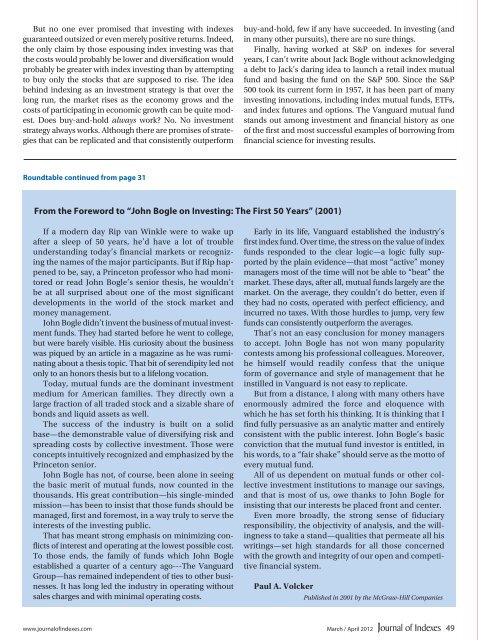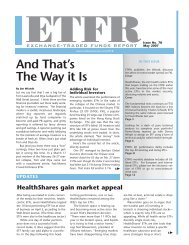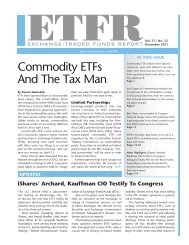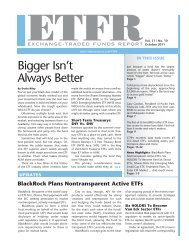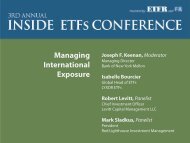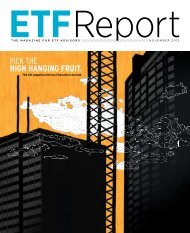You also want an ePaper? Increase the reach of your titles
YUMPU automatically turns print PDFs into web optimized ePapers that Google loves.
But no one ever promised that investing with indexes<br />
guaranteed outsized or even merely positive returns. Indeed,<br />
<strong>the</strong> only claim by those espousing index investing was that<br />
<strong>the</strong> costs would probably be lower and diversification would<br />
probably be greater with index investing than by attempting<br />
to buy only <strong>the</strong> stocks that are supposed to rise. The idea<br />
behind indexing as an investment strategy is that over <strong>the</strong><br />
long run, <strong>the</strong> market rises as <strong>the</strong> economy grows and <strong>the</strong><br />
costs of participating in economic growth can be quite modest.<br />
Does buy-and-hold always work? No. No investment<br />
strategy always works. Although <strong>the</strong>re are promises of strategies<br />
that can be replicated and that consistently outperform<br />
buy-and-hold, few if any have succeeded. In investing (and<br />
in many o<strong>the</strong>r pursuits), <strong>the</strong>re are no sure things.<br />
Finally, having worked at S&P on indexes for several<br />
years, I can’t write about Jack Bogle without acknowledging<br />
a debt to Jack’s daring idea to launch a retail index mutual<br />
fund and basing <strong>the</strong> fund on <strong>the</strong> S&P 500. Since <strong>the</strong> S&P<br />
500 took its current form in 1957, it has been part of many<br />
investing innovations, including index mutual funds, ETFs,<br />
and index futures and options. The Vanguard mutual fund<br />
stands out among investment and financial history as one<br />
of <strong>the</strong> first and most successful examples of borrowing from<br />
financial science for investing results.<br />
Roundtable continued from page 31<br />
From <strong>the</strong> Foreword to “John Bogle on Investing: The First 50 Years” (2001)<br />
If a modern day Rip van Winkle were to wake up<br />
after a sleep of 50 years, he’d have a lot of trouble<br />
understanding today’s financial markets or recognizing<br />
<strong>the</strong> names of <strong>the</strong> major participants. But if Rip happened<br />
to be, say, a Princeton professor who had monitored<br />
or read John Bogle’s senior <strong>the</strong>sis, he wouldn’t<br />
be at all surprised about one of <strong>the</strong> most significant<br />
developments in <strong>the</strong> world of <strong>the</strong> stock market and<br />
money management.<br />
John Bogle didn’t invent <strong>the</strong> business of mutual investment<br />
funds. They had started before he went to college,<br />
but were barely visible. His curiosity about <strong>the</strong> business<br />
was piqued by an article in a magazine as he was ruminating<br />
about a <strong>the</strong>sis topic. That bit of serendipity led not<br />
only to an honors <strong>the</strong>sis but to a lifelong vocation.<br />
Today, mutual funds are <strong>the</strong> dominant investment<br />
medium for American families. They directly own a<br />
large fraction of all traded stock and a sizable share of<br />
bonds and liquid assets as well.<br />
The success of <strong>the</strong> industry is built on a solid<br />
base—<strong>the</strong> demonstrable value of diversifying risk and<br />
spreading costs by collective investment. Those were<br />
concepts intuitively recognized and emphasized by <strong>the</strong><br />
Princeton senior.<br />
John Bogle has not, of course, been alone in seeing<br />
<strong>the</strong> basic merit of mutual funds, now counted in <strong>the</strong><br />
thousands. His great contribution—his single-minded<br />
mission—has been to insist that those funds should be<br />
managed, first and foremost, in a way truly to serve <strong>the</strong><br />
interests of <strong>the</strong> investing public.<br />
That has meant strong emphasis on minimizing conflicts<br />
of interest and operating at <strong>the</strong> lowest possible cost.<br />
To those ends, <strong>the</strong> family of funds which John Bogle<br />
established a quarter of a century ago---The Vanguard<br />
Group—has remained independent of ties to o<strong>the</strong>r businesses.<br />
It has long led <strong>the</strong> industry in operating without<br />
sales charges and with minimal operating costs.<br />
Early in its life, Vanguard established <strong>the</strong> industry’s<br />
first index fund. Over time, <strong>the</strong> stress on <strong>the</strong> value of index<br />
funds responded to <strong>the</strong> clear logic—a logic fully supported<br />
by <strong>the</strong> plain evidence—that most “active” money<br />
managers most of <strong>the</strong> time will not be able to “beat” <strong>the</strong><br />
market. These days, after all, mutual funds largely are <strong>the</strong><br />
market. On <strong>the</strong> average, <strong>the</strong>y couldn’t do better, even if<br />
<strong>the</strong>y had no costs, operated with perfect efficiency, and<br />
incurred no taxes. With those hurdles to jump, very few<br />
funds can consistently outperform <strong>the</strong> averages.<br />
That’s not an easy conclusion for money managers<br />
to accept. John Bogle has not won many popularity<br />
contests among his professional colleagues. Moreover,<br />
he himself would readily confess that <strong>the</strong> unique<br />
form of governance and style of management that he<br />
instilled in Vanguard is not easy to replicate.<br />
But from a distance, I along with many o<strong>the</strong>rs have<br />
enormously admired <strong>the</strong> force and eloquence with<br />
which he has set forth his thinking. It is thinking that I<br />
find fully persuasive as an analytic matter and entirely<br />
consistent with <strong>the</strong> public interest. John Bogle’s basic<br />
conviction that <strong>the</strong> mutual fund investor is entitled, in<br />
his words, to a “fair shake” should serve as <strong>the</strong> motto of<br />
every mutual fund.<br />
All of us dependent on mutual funds or o<strong>the</strong>r collective<br />
investment institutions to manage our savings,<br />
and that is most of us, owe thanks to John Bogle for<br />
insisting that our interests be placed front and center.<br />
Even more broadly, <strong>the</strong> strong sense of fiduciary<br />
responsibility, <strong>the</strong> objectivity of analysis, and <strong>the</strong> willingness<br />
to take a stand—qualities that permeate all his<br />
writings—set high standards for all those concerned<br />
with <strong>the</strong> growth and integrity of our open and <strong>com</strong>petitive<br />
financial system.<br />
Paul A. Volcker<br />
Published in 2001 by <strong>the</strong> McGraw-Hill Companies<br />
www.journalofindexes.<strong>com</strong> March / April 2012 49


